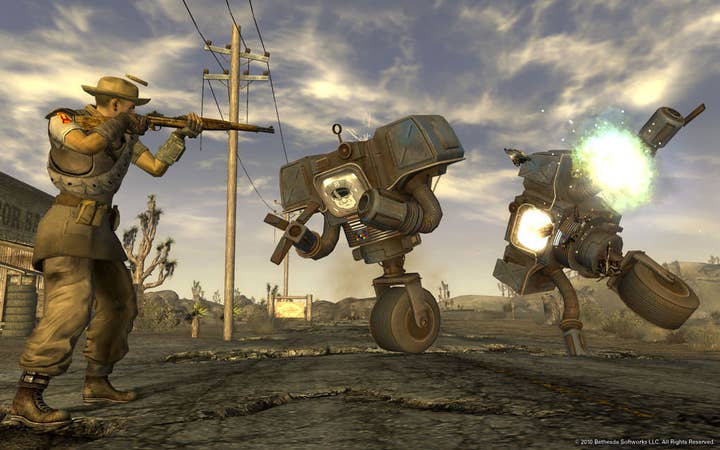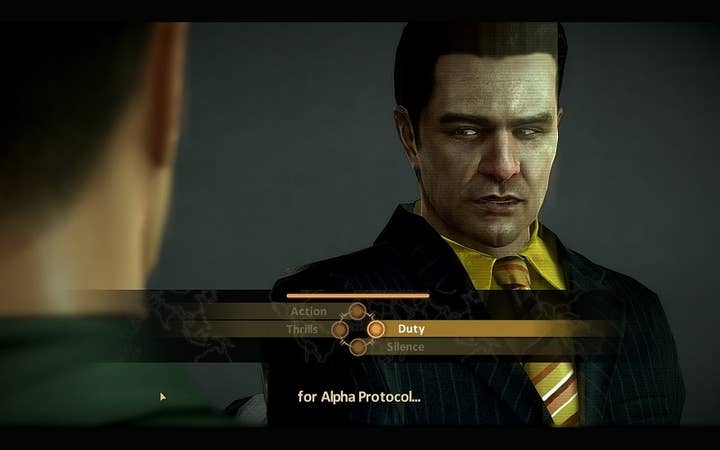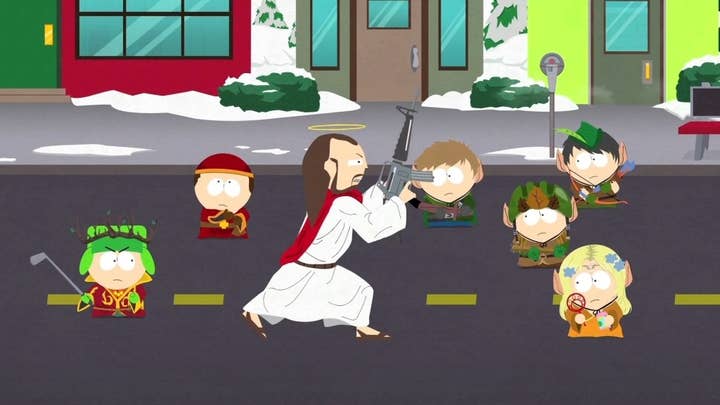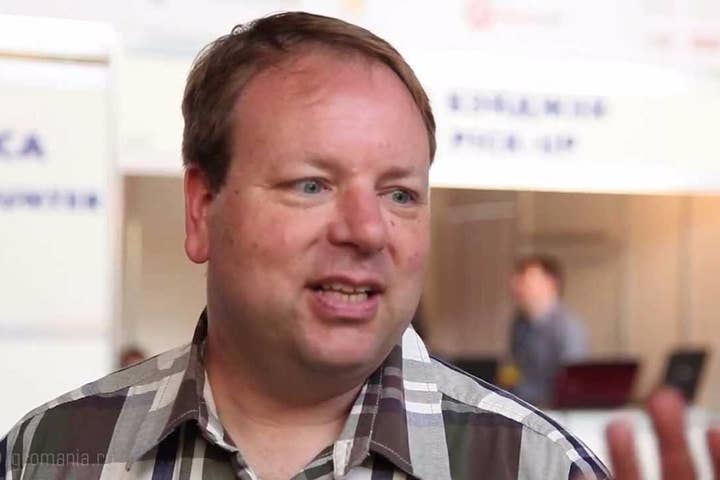Obsidian Entertainment: Survival, success and independence
CEO Feargus Urquhart on 13 years in AAA development - "We just want to be in a financial situation where we're not worried all the time"
Even if you don't know Feargus Urquhart's name, you'll certainly be familiar with his work. In fact, across the 25 year span of his career, Urquhart may have worked on or been directly responsible for some of your favourite ever releases: as a producer at Interplay, Baldur's Gate; as the president of Black Isle Studios, Fallout 2 and Planescape: Torment; as the co-founder and CEO of Obsidian Entertainment, Knights of the Old Republic 2 and Fallout: New Vegas.
Urquhart was at Digital Dragons to share the lessons he has learned from his quarter century in the games industry, nearly all of it spent working on AAA projects and collaborating with publishers. Getting there and staying there hasn't been easy, however, and Obsidian's path has often been defined as much by compromise and error as the wit, verve and unique ideas found in its games. In this refreshingly frank interview, Urquhart reflects on what it means to be a AAA independent studio in 2016, the "kinda broken" dynamic between publishers and developers, and the true value of Obsidian returning to its roots with Pillars of Eternity.
They were big projects, yes, and I think that… It was interesting. As an independent developer you can be on this treadmill, and we were always trying to break away from that. It was a period with all this opportunity, and sometimes we got in our own way.
"I've got 200 people and they've all gotta be paid. That changes your whole mindset... That means there's always a gun to your head"
With Fallout: New Vegas, sometimes I look back on that and think, 'Should we have pushed for a larger budget? What could we have done to have it launch better?' Because there's two parts to a launch: the publisher and the developer, and that's our part. So what could we have done? With Dungeon Siege, I should have pushed much harder to do like a Battle.net-like multiplayer, and not the multiplayer we had. The multiplayer we had was just what fit into the budget.
We were running into those issues, and that was my day to day. A penny here and a penny there. It was hard, and I think that's what really restricted us from launching out. The difficult thing, and I'm sure you hear this from independent developers all the time, when you get done with a game not many developers work with the same publisher again - not right away.
Ten? That would be about it.
Actually, it feels more dangerous. When you're a five-person studio you can all go unpaid for a while. I've got 200 people and they've all gotta be paid. That changes your whole mindset. That totally matters. I want everyone who works at Obsidian to always have a pay cheque. The owners have taken periods of time where we didn't get paid, but it's our company - we can do that. But everyone else has always been paid for more than 13 years.
The challenge is that that means there's always a gun to your head. So that's the game, right? 'Developer, you need to do this.' But I don't think I should do that. 'Well, then you don't get paid.' I want to pay my people, so the math is pretty simple.

It is. Well, you have three choices: you can spend your own money, you can lie, or you can do what you're told. And, generally, we've always chosen that we'll just do what we're told - even when we don't believe in it.
I think that's maybe the difference now from where we were before. I also know this - and I'd give this piece of advice to anybody, and it's hard to do and it's hard to take - when you have that gun to your head you've got to get the gun away. At some point in time you have to go, 'I'm not going to keep on doing this.' I solve a short-term problem so my people will get paid, but to do that either I'm going to feel dirty or I'm going to tell those people that, guess what? All of your creativity doesn't matter. You have to do what our publisher tell us.
Right. 'You're a contractor.' But that's not what a lot of people signed up to be. In the end, I know they don't want to do that in the long-term, and so I have to make that call. And we've had these conversations, and people get mad. 'Tell 'em to go screw off,' right? And I'm like, okay, I can tell 'em to go screw off, but they might say, 'Well, you screw off, and you won't get paid.' And they're like, 'Well then we don't get paid!' But that's too easy.
"We just want to be in a financial situation where we're not worried all the time. Worry is the gun to your head. It changes how you make decisions"
Another example is not compromising at the beginning. I would rather blow up a relationship at 6 months rather than month 18. At 6 months, it's recoverable. Nobody's in for a lot of money and we may even figure something else out with that publisher. At 18 months, and you're $18 million in - I don't know, you could be - everybody is mad, enraged at each other. It's better to blow something up early, and that's what we've started to do.
So, with Alpha Protocol, the challenge was that we weren't even totally sure what we wanted to make until, like, way into the game - and that's bad. You can do that with your own money; when you're doing that with someone else's money they're just getting mad, they're getting mad at you more and more and more. The story's bigger than that, but I think I'd go back to what I was just saying: you've gotta cut it early. For that reason, as a developer, you have to take it on yourself to prove your ideas quickly. You need to show yourself that you can make the game, that you understand the game.
It's too easy to not be critical. To not say, 'Okay, that all sounds wonderful, but what's the plan? Like, really, what is the plan?' That's where we've made big mistakes in the past: not holding to our plans. That doesn't sound like sexy development, right? But if we haven't proven it, let's know that now. Let's look at it and go, 'Oh, it's like an ugly little child. That's not good. So what do we do with it?' And it's too easy at that point to add just a little bit more here, and it'll be good, and everything will be fine. No. 'Should we cut it?'
I think publishers should kill way more games way earlier, but if we do that ourselves it makes us more reasonable about what we can actually accomplish early on. We weren't doing that, and that put pressure on our publishers.
No, it wouldn't be my call, but we always should look at the fact of, 'Would we kill this game?' It's nice if the publisher keeps on paying us for another year, but if we would kill it then it really should be killed. So back up from that: what are we doing today to make sure we can do what we want and have the game not be killed? We're now doing that on day 2, and not day 430.
That's what we did too much of before. We just kept on going, sweeping this and that problem under the rug - sweep, sweep, sweep, it's all fine. And you get to a point and it's screwed.

Yes. Yeah. That happened to us, and I think that's what happens to a lot of developers. They're just keeping it all together. We frustrated our publishers a lot, and we frustrated ourselves.
Oh, yes.
No it's not, and that's...yeah.
"There's periods of time with our games where there's been, like, two testers at a publisher working on it. I can't make them do it"
I split it into two, because you're right: there are things that are beyond my control. I can do the best job ever, be on budget, be on time, be on everything - and that has actually happened with a game or two… There's these odd things that we're not in control of that can really have an impact on us.
It really frustrates me when I'm fighting with a publisher to put testers on a game, or I'm fighting with a publisher because they have some other game that they're shipping earlier and they move all the testers off. There's periods of time with our games where there's been, like, two testers at a publisher working on it. I can't make them do it. I can't terminate the contract.
Absolutely. Absolutely.
And what do we put in our contracts now? A minimum number of testers.
And no Metacritic related bonuses, absolutely. Because I can't control it. It's not in our best interests.
That's just the way it is. You've gotta roll with it.
I don't want to make excuses. I hate making excuses, but I think what's also very interesting about our industry is that developers are uncomfortable and feel that they shouldn't ever make any criticism about publishers. That's one of the other challenges, and I don't really know what to do about this, because there's a whole group of people that do have an effect on our businesses, and is there any sort of responsibility there? They can kinda do what they want. I don't know if that's bad to say.
"I would rather blow up a relationship at 6 months rather than month 18. At 6 months, it's recoverable"
It gets even more interesting when you start thinking about the economy of it as well. We've thought a lot about what it takes to make a big game, and what's the reward we get for making a big game. At some point we have to look at ourselves as a business, so it's our job to make money. For me to go off and do - and we're not doing this, but let's just say - Knights of the Old Republic 3, and it's going to cost $50 million, and I'll make $7.5 million on milestones and then maybe I'll make another $5 million in royalties. That's pretty good for an independent developer on a project. But, y'know, I can make more profit from two Pillars of Eternitys than I can from one of those games. And then on top of that, if it's a smaller game and it's successful, I'll own it. I'm not gonna own Star Wars.
I'm not saying that publishers are bad for that - it's an immense amount of money to invest in something - but that's where, working with an independent developer, the system is a little bit broken. When someone builds an aircraft carrier for the navy, do they run that project like an independent developer works in the games industry? That ship builder is independent from the navy, but that relationship is immensely different from the relationship that we have.
Let's say you need some contracting work. The contractor shows up, you figure it out, and maybe it's going to be $10,000. They'll ask for $3,000 upfront, and you're like, 'Okay. I get it.' Let's say I do a $50 million game. For me to get more than $500,000 upfront is a fight. Again, this is not 'publishers are evil' or anything like that, but that world is kinda broken.

Oh yeah, absolutely.
Absolutely. I mean, yeah, I'd like a Lamborghini in every colour of the rainbow, of course, but really we just want to be in a financial situation where we're not worried all the time. Worry is the gun to your head. It changes how you make decisions. Pillars of Eternity's success lets us do things. It lets us make a game in the way we want to make it, and that is so helpful.
Everyone feels really good about the work, and the crowdfunding was really huge. Having the IP, for once we get to do cool stuff with it. We can go make websites. We're making a board game. It's pride. You have more pride in your company when you have something like that.
"Having the IP, for once we get to do cool stuff with it... It's pride. You have more pride in your company when you have something like that"
The stuff we're really working on is Armored Warfare, which is our big one, and then Tyranny, we're starting to move forward on Pillars of Eternity 2, and we've just shipped the digital version of the Pathfinder card game. Then we have a few people working on something new. We hired Leonard Boyarsky recently, who's one of the co-creators of the original Fallout.
Well, no [laughs]. We're not working on a Fallout. People have said that we should just crowdfund everything now, and I think we should crowdfund some stuff, but if we want to go and do something big we need to get that extra funding. We can't raise $30 to $50 million.
And then there's the question of how many times you should go back to that well, and what's fair, and what's right. With Tyranny also, that was a number of people who had just come off the South Park team, so that started in early 2013. We had the Eternity money, but that was for Eternity. How we stay in business is just constantly managing that cash, so with Tyranny we funded it for a little while and we reached a point where we needed to have either not a big development staff on it, or we needed to shut it down, or we needed to partner with somebody.
They're good guys. It all moved very fast with them.
I think the only thing I'd want to do right now, and this is a hard thing, because when you have something really big and live like Armored Warfare, there are people that have been working on that for coming up four years, and most of the team between two-and-a-half and three. They want to start doing different stuff, so our one challenge right now is that we have a game that needs live support, and we have these other games where, some of them, like Tyranny, are coming up on being final. Sorry, getting towards final - that's not a date. I can't take Armored Warfare people and put them on Tyranny, and vice versa. Everybody's locked. We need to figure that out better, and I don't have the answer yet.
"I am fine being independent in 13 years. I would be okay if we got purchased, but I would be fine independent"
Yes. There are some people that we have transferred off, but we need to make that plan better.
I thought we would have our own engine at this point - and we tried. I thought we would have been purchased by now. I thought we wouldn't be as big as we are.
Yeah, exactly. And the big thing I've learned from all that is, it's so hard to plan this stuff. If you told me four or five years ago that we'd be working on a free-to-play tank game, and our own crowdfunded IP, and that we'd shipped a South Park game - there was nothing in our business plan five years ago that said any of that. There isn't a single thing we're doing today that was in that business plan.
I am fine being independent in 13 years. I would be okay if we got purchased, but I would be fine independent. Ultimately, we need to be good at what we do. It goes back to what we were saying about things that are beyond our control. Well, there are things that are in our control, so let's not screw those things up.
We can keep doing great stuff with Eternity. I'd love to turn Eternity into more like a Skyrim product. I'd love to do a science fiction game. I just want to keep making role-playing games - I do, and the team does. Whether that's independent or not, making RPGs we can be proud of is the goal. And that's what I can look back on. We've been very proud of a lot of what we've done as a team.
Whether the Metacritic was 75 or 95, we've been very proud of what we've done.
GamesIndustry.biz is a media partner for the Digital Dragons conference. Our travel and accommodation costs were provided by the organiser.


